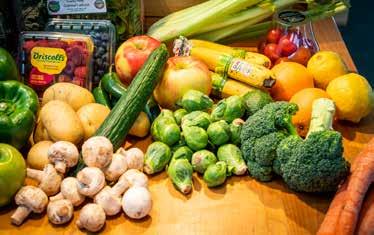
7 minute read
Local Vendors Innovate
Food Service
LOCAL VENDORS INNOVATE TO SURVIVE

At Redhead Creamery they take pride in knowing that each cheese is aged appropriately for the best possible flavor, texture and appearance.
PHOTOS COURTESY OF REDHEAD CREAMERY

Redhead Creamery founder, Alise Sjostrom, shares a love of cheese with her husband, Lucas.
BY TAMARA CHOAT
It’s true that crisis can drive innovation – just think of the space team of Apollo 13, miraculously reconfiguring oxygen tanks. As Covid-19 has swept the globe disrupting systems from health care to education to food supply, small business owners have had to either innovate – or watch their company struggle for air.

Distilleries and skin care companies have become hand sanitizer manufacturers. Specialty boutiques are hosting pop-up sales events online. Restaurants have shifted to curb-side pickup.
In the rural, central Minnesota town of Brooten, Alise Sjostrom and her family own and operate Redhead Creamery. Two months ago they were a thriving dairy and destination artisan cheese shop, built on a dream Sjostrom had since
Redhead Creamery owner Alise Sjostrom's mom, Linda, is an integral part of operations on the family-owned dairy and cheese facility.



childhood to return to her family farm and make cheese. In 2013 she crafted her first batch of farmstead cheese and in 2014 opened the processing facility, complete with an underground pipeline that carries milk still warm off the cow to curdling vats. The tasting room offers “ridiculously good” cheese trays, craft beer and tours, and serves as an idyllic event center.
“We are kind of a shop in the middle of nowhere,” says Sjostrom. “We’ve found it’s the journey that brings people out here.” Their customers come from the Twin Cities and other urban areas to participate in the culinary and agritourism experience. Redhead Creamery marketed their wares – aged cheddars, whiskey washed munster, creamy brie and fresh curds – primarily to restaurants through a distributor.
“Well, that was what we normally did,” says Sjostrom. In mid-March as the virus spread, everything changed drastically.
Redhead Creamery was doing a limited amount of direct sales to customers – but suddenly it became their means of survival. They launched paid advertising, mapped out a delivery route and started packing up coolers in the back of pickup beds. “Now we are literally delivering cheese to our customers’ doors or
For Alise Sjostrom, here with her husband Lucas and their daughers, making cheese is a family affair.


meeting them somewhere where we can safely transfer their order,” says Sjostrom. Their primary routes include to the Twin Cities as well as Sioux Falls, S.D., with stops along the way.
“It was something we quickly decided to try out of necessity; we needed to get our bills paid and have cash flow.”
The idea exploded – in a good way. Sjostrom says they have been overwhelmed with sales and while the national quarantine has meant boredom for a lot of people, “we are feeling a little overwhelmed, and we could really use a nap.”
She said the support from as far as three states around them has been amazing. “No one wants to go into stores right now, and they also want to support small, local businesses,” she says. “We’re encouraged by all the people who want us to keep rolling.”
Sjostrom says even though the short-term is so successful they laughingly wish they were making butter and bottling milk as well, they don’t have a clear idea of what long-term will look like. She says large-scale, continued delivery would have to include designated employees and specialized delivery trucks.



“It will be interesting to see if people’s buying habits change or not once we get through this,” she says. “I don’t know what that will look like.”

As Redhead Creamery started packing ice chests with cheese, several states away in Bozeman, Mont., Jamie Van Dyke and her business partners of Produce Depot, a wholesale, locally-raised fruit and vegetable distribution business, also knew they had to start packing – one way or another.
Two months before COVID-19 hit, the partners had finalized an expansion of their business from the Big Sky and Bozeman area, where they worked strictly on a wholesale basis, to Billings. “The timing couldn’t have been worse – we had just signed a lease on this huge warehouse,” says Van Dyke. But when the Big Sky resorts that comprised the majority of their business closed completely they started thinking outside the bag and shifted from a wholesale to a retail mindset almost overnight.

Fruits and vegetables come in bulk to Produce Depot's warehouses in Bozeman and Billings, and are bagged for individual customer deliveries. PHOTO COURTESY OF PRODUCE DEPOT.
“Our initial idea was to do a ‘community supported agriculture’ type offering out of our wholesale locations, where people come in and fill their own bags with produce for a flat $30 fee,” says Van Dyke. They quickly realized they were not dialed in on the costs and profit margins of people filling their own bags. However, that was soon a moot point when Montana’s shelter-in-place edict was issued.

So they shifted to a pick-up option – customers would order a $30 bag and Produce Depot controlled the contents – which they offered out of their warehouses in both Bozeman and Billings. “That went well, so we decided to add a delivery route,” says Van Dyke. “It took off like crazy.”
They started by delivering 20 bags a day and have now capped orders at 250 in each location, with about 170 of those deliveries. “We have demand for way more, but we have maxed out on our staff and capacity for the time being,” she says.
Even though Produce Depot shifted gears on the go, it wasn’t an overnight success.
“The first time we did residential deliveries, we were like: ‘What are we doing? This is way too much work and we’re losing money!’” says Van Dyke. The team reevaluated inputs and organizational structure, adding a website to take orders and payment – eliminating 500-600 daily emails and 15-hour work days. “It’s working great now and it’s making money, but it took a lot to survive to get to this stage.”
They try and buy local as much as possible, and are open to ideas of local products that match their model. Van Dyke says for her and her partners, there was no choice but to innovate.
“We had all put everything we have into this venture, and if it didn’t work we were screwed. We had no other option. We put our heads together said ‘We have to figure this out,’” but it has been a rough couple of weeks.”
Van Dyke says the fact that all three of them grew up in Montana – she was raised on a registered Angus ranch near Bozeman – provided a similar foundation of hard work ethic for their team, which got them through the late nights and long days. And there are some silver linings.
“I think this pandemic is going to make the local food movement stronger. If there’s anything positive I’ve seen it’s local people coming together and supporting local businesses,” Van Dyke says. “I wouldn’t call the virus a blessing because what is going on in the world right now is not a blessing, but it did make our business stronger and I think it will make us all stronger.”
Produce Depot rapidly changed their business model to adapt to the COVID19 crisis, and started a doorstep delivery service of locally-raised produce.
At AgriMAX, our goal is simple: to help our customers become better


Professional services offered: • SEED RETAIL • Custom Tailored Seed Treating • • Crop Scouting and Consulting • • Crop Protection Product Retail • • Custom Aerial and Ground Application • • Research
www.agrimaxllc.com

Ellendale
109 Main St Ellendale, ND 58436 Phone: (701) 349-2474
Winner
31710 Harvest Road Winner, SD 57580 Cell (605) 840-0049 Office (605) 842-2050
WE OFFER • DRY & LIQUID FERTILIZER
APPLICATION • SOIL ANALYSIS • CCA ON STAFF














